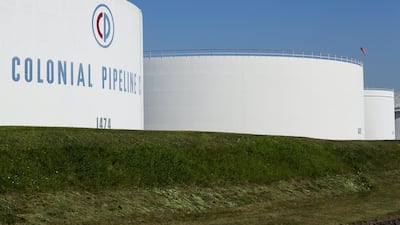Oil prices rose during the opening session on Monday after a cyber attack on a critical US pipeline system endangered supplies to the country's East Coast.
West Texas Intermediate, the benchmark for that tracks US domestic crude grades, was up 0.51 per cent at $65.23 a barrel at 2.10pm UAE time.
Brent, the international benchmark under which two thirds of the world’s crude is traded, was up 0.54 per cent at $68.65 a barrel.
A ransomware attack on Friday led to the temporary closure of the Colonial Pipeline, the most significant route for transporting refined products such as petrol, diesel and jet fuel.
The pipeline, which has a capacity of 2.5 million barrels per day, delivers about half of the fuel consumed by states along the US Gulf Coast.
A ransomware attack involves hackers infecting networks with malicious software that encrypts data and leaves machines locked until the victims pay an extortion fee.
The hack is the biggest cyber attack on a US pipeline. The company has yet to mention when it will resume service, something that has left traders concerned.
The US government issued emergency laws to allow for fuel to be transported by road.
“The Colonial Pipeline hack headlines at the weekend have lifted oil prices in Asia as markets fear US supply line disruptions in refined products,” said Jeffrey Halley, senior market analyst for the Asia-Pacific region at Oanda.
The attack resulted in supply concerns linked to refined products and not crude, resulting in a 2 per cent rise in petrol futures in Asia, he said.
Petrol futures surged by as much as 4.2 per cent yesterday to their highest level since May 2018 before softening.
“If progress is made reversing the disruption and restoring systems, oil futures could see some short-term selling pressure,” said Mr Halley.
The shutdown of the pipeline as a precautionary measure will affect the supply of refined products along the Gulf Coast to the East Coast.
The pipeline was built in the 1960s and covers a distance of 8,850 kilometres, carrying an amount of products equal to the total consumption of Germany, Europe’s largest economy and the world’s fourth biggest.
Colonial Pipeline said its main lines remain offline. However, some lateral lines joining terminals and delivery points are now operational.
“We are in the process of restoring service to other laterals and will bring our full system back online only when we believe it is safe to do so,” the company said on Sunday.
The disruption and lack of clarity on when Colonial Pipeline is expected to resume operations resulted in an increase in prices.
Prices were inching closer to $70 a barrel even before the attack, despite concerns about a possible decline in demand in India, the world’s third-largest oil consumer.
Oil prices had gained from a positive demand outlook as the Opec+ producer alliance committed to gradual production increases amid growing demand for fuel in developed countries.
“WTI is supported by the latest cyber attack on the US Colonial pipeline. The cyber incident, combined with the prospects of improved global demand, provides a stronger case for a further advance to the $68 to $70 region,” said Ipek Ozkardeskaya, a senior analyst at Swissquote.
Oil prices are up more than 30 per cent this year as developed countries, which introduced successful vaccination campaigns, ease lockdown measures.



